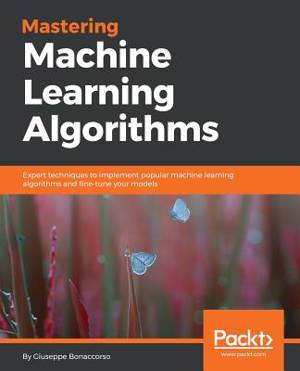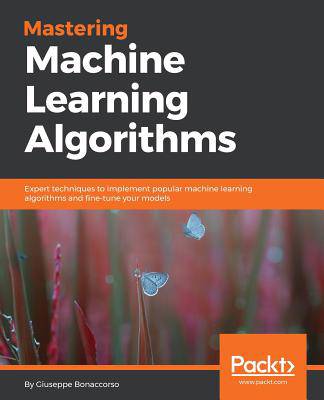
- Retrait gratuit dans votre magasin Club
- 7.000.000 titres dans notre catalogue
- Payer en toute sécurité
- Toujours un magasin près de chez vous
- Retrait gratuit dans votre magasin Club
- 7.000.0000 titres dans notre catalogue
- Payer en toute sécurité
- Toujours un magasin près de chez vous
Mastering Machine Learning Algorithms
Expert techniques to implement popular machine learning algorithms and fine-tune your models
Giuseppe BonaccorsoDescription
Publisher's Note: This edition from 2018 is outdated and is not compatible with TensorFlow 2 or any of the most recent updates to Python libraries. A new second edition, updated for 2020 with coverage of neural network implementation, reinforcement learning, and more using Python 3.8 and TensorFlow 2.x, has now been published.
Key Features
- Discover high-performing machine learning algorithms and understand how they work in depth
- One-stop solution to mastering supervised, unsupervised, and semi-supervised machine learning algorithms and their implementation
- Master concepts related to algorithm tuning, parameter optimization, and more
Book Description
Machine learning is a subset of AI that aims to make modern-day computer systems smarter and more intelligent. The real power of machine learning resides in its algorithms, which make even the most difficult things capable of being handled by machines. However, with the advancement in the technology and requirements of data, machines will have to be smarter than they are today to meet the overwhelming data needs; mastering these algorithms and using them optimally is the need of the hour.
Mastering Machine Learning Algorithms is your complete guide to quickly getting to grips with popular machine learning algorithms. You will be introduced to the most widely used algorithms in supervised, unsupervised, and semi-supervised machine learning, and will learn how to use them in the best possible manner. Ranging from Bayesian models to the MCMC algorithm to Hidden Markov models, this book will teach you how to extract features from your dataset and perform dimensionality reduction by making use of Python-based libraries such as scikit-learn v0.19.1. You will also learn how to use Keras and TensorFlow 1.x to train effective neural networks.
If you are looking for a single resource to study, implement, and solve end-to-end machine learning problems and use-cases, this is the book you need.
What you will learn
- Explore how a ML model can be trained, optimized, and evaluated
- Understand how to create and learn static and dynamic probabilistic models
- Successfully cluster high-dimensional data and evaluate model accuracy
- Discover how artificial neural networks work and how to train, optimize, and validate them
- Work with Autoencoders and Generative Adversarial Networks
- Apply label spreading and propagation to large datasets
- Explore the most important Reinforcement Learning techniques
Who this book is for
This book is an ideal and relevant source of content for data science professionals who want to delve into complex machine learning algorithms, calibrate models, and improve the predictions of the trained model. A basic knowledge of machine learning is preferred to get the best out of this guide.
Spécifications
Parties prenantes
- Auteur(s) :
- Editeur:
Contenu
- Nombre de pages :
- 576
- Langue:
- Anglais
Caractéristiques
- EAN:
- 9781788621113
- Date de parution :
- 25-05-18
- Format:
- Livre broché
- Format numérique:
- Trade paperback (VS)
- Dimensions :
- 190 mm x 235 mm
- Poids :
- 975 g







